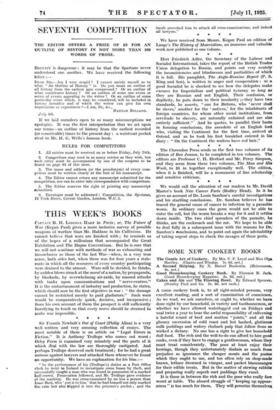THIS WEEK'S BOOKS
CAPTAIN B. H. LIDDELL HART in Paris; or, The Future of War (Kegan Paul) gives a more inclusive survey of possible weapons of warfare than Mr. Haldane in his Callinicus. He cannot believe that wars are finished with ; he reminds us of the hopes of a millenium that accompanied the Great
Exhibition and The Hague Conventions. But he is sure that we will not continue with methods of war so exhausting and inconclusive as those of the last War—when, in a very true sense, both sides lost, when there was for four years a stale-
mate in which all the resources of every country participating were drained to the utmost. Wars will be decided, he thinks, by sudden blows struck at the moral of a nation, by propaganda,
by blockade, by overwhelming air-raids, by massed attacks with tanks upon communications and " nerve-centres." It is the embarrassment of industry and production, he states, which should now be the first objective in war : " the damage cannot be restricted merely to paid gladiators." Such wars would be comparatively quick, decisive, and inexpensive ; from his own account of them the prospect is still sufficiently horrifying to teach us that every nerve should be strained to make war impossible.


























































 Previous page
Previous page